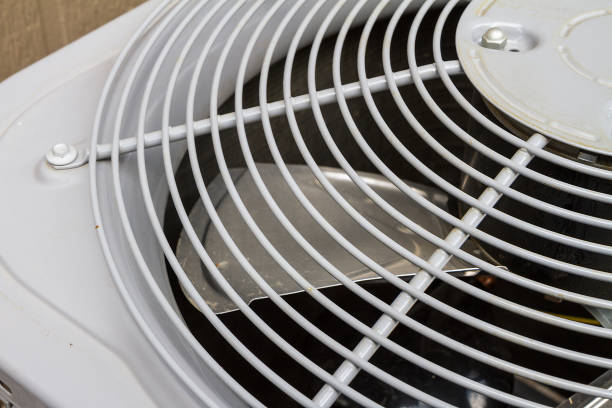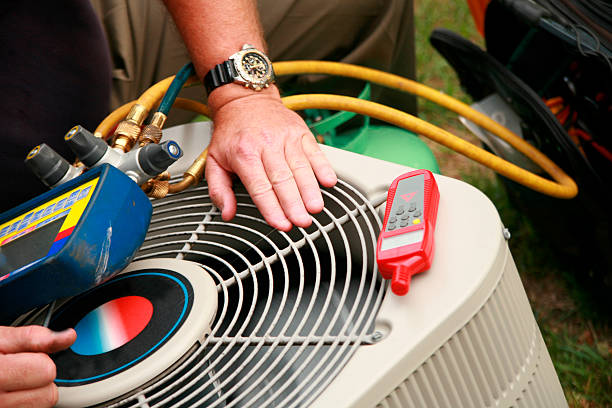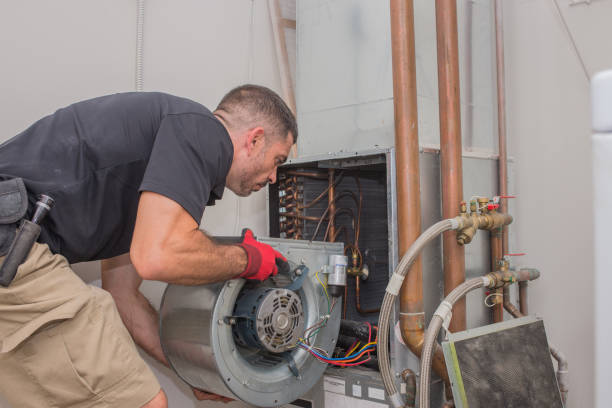If the Condenser Fan Motor Fails and the Unit Continues to Run It Will Cause
September 26, 2022

Like most homeowners, you probably don't understand the inner workings of your air conditioner, nor do you wish to. All you care about is that it continues to produce that refreshing cold air you rely on to keep your Las Vegas home cool.
If you're mechanically inclined and interested in learning some basics about how an AC functions, keep reading! We will discuss an important part of your AC unit, the fan motor.
Your AC is rendered useless without a functioning fan or furnace blower motor. This could also mean that you need a furnace repair or should start looking at costs for blower motor replacement. In addition, you will either suffer from no air or weak airflow with fan problems.
Here's what you need to know about an AC fan motor:
- what signs to look out for that indicate a faulty motor
- how to avoid it from going bad sooner than it should
What Is an AC Fan Motor?
The fan motor is a fairly uncomplicated yet vital part of an air conditioner. It's the part of the unit that pumps air through the system. Without that circulation of air, your AC won't cool your home.
Because the fan motor is one of the hardest working parts of an air conditioner, it is subjected to a lot of wear and tear that can lead to frequent repairs or replacements. The cost can add up when you start thinking about replacements and labor. Once the fan motor breaks down, the AC will stop blowing cold air, and that's something you don't want on a hot summer's day.
Five Signs That Indicate a Failing AC Fan Motor
When your air conditioner suddenly breaks down, it's difficult to know where to start in identifying the problem.
1. The Fan Won't Start Even Though the AC Is On
When the fan doesn't start even though the AC is turned on, it can be a clear sign that there's a fault with the motor. When the AC runs without the fan circulating air, it can eventually lead to the evaporator coils freezing over. Once this happens, your air conditioning unit is at risk of more serious damage. Turn the AC off and call an HVAC technician.
2. The Fan Continues To Run, Even When Shutting Off the AC
Equally frustrating is a fan that works, but the blades rotate very slowly. A slow-turning fan will generate weak airflow. If your AC offers different fan settings, check if it is set at low speed. If that isn't the case, it could mean the motor bearings must be oiled, or the capacitor has failed.
3. The Fan Is on but Rotating Very Slowly
Equally frustrating is a fan that doesn't work, even when the blades rotate very slowly. A slow-turning fan will generate weak airflow. If your AC offers different fan settings, check if it is set at low speed. If that isn't the case, it could mean the motor bearings must be oiled, or the capacitor has failed.
4. The Fan Runs Intermittent
When the fan runs intermittently, it could be one of two problems. First, the motor could be overheating, which causes it to cut out. Alternatively, a loose wire, connection, or a short in the motor windings could be the culprit.
Any electrical-related problems should only be addressed by a professional. For example, never attempt to work on a fan motor when you suspect an electrical issue. This can be dangerous and is a job best left to a trained HVAC technician or electrician.
5. There's A Rattling or Buzzing Noise Coming from the Condenser Unit When the Fan Is Turned On
There is more than one possible cause of a noisy air conditioner.
- If you hear a loud rattling noise, it could be a minor issue like loose stones or debris that's caught in the condensing unit.
- A rattling noise can also be caused by loose or unbalanced fan blades striking the side of the fan housing unit.
- If you don't see anything stuck in the condensing unit and the fan blades turn freely and smoothly, then the likely cause is the fan motor.
- If you hear a buzzing sound, it's another sign the motor is reaching the end of its life.
Steps You Can Take to Identify a Problem With the AC Fan

If the AC fan motor is bad or there is a faulty capacitor, you should always contact an expert HVAC technician ****to repair or replace parts. However, you can take some preliminary steps to rule out other possible causes for your AC not working.
Check For a Tripped Circuit Breaker
Sometimes, an air conditioner not working is as simple as a tripped breaker. The first step is to check the circuit breaker. When the AC is not working properly, a tripped circuit breaker isn't the first thing that comes to mind for most people. However, a tripped breaker is a surprisingly common reason for an AC not starting.
Check the Air Filter
When was the last time you replaced the AC unit's air filter? Unfortunately, many homeowners neglect this essential maintenance task. A clogged air filter reduces airflow. If the air filter is clogged, replacing it with a new one should get the air flowing freely and strongly again.
Check the Outdoor Unit
If you've ruled out the above problems, it's time to head outside to the condensing unit. If your AC has stopped blowing air, has weak airflow, or you hear unusual noises, do a quick inspection of the fan motor. The motor is located in the condenser unit. Listen for a humming sound that tells you the AC compressor is functioning.
Next, look through the vents at the top of the unit to see the fan. Are the fan blades turning? The motor is faulty if the compressor is working, but the fan blades are not spinning. That's your cue to turn the system off and call the pros to repair the AC fan motor.
What Your HVAC Technician Will Do

Replacing an HVAC motor is a job that can be done quickly once the problem is identified.
Conduct a Visual Inspection
A trained technician can quickly spot specific problems on a visual inspection of the condenser unit. For instance, after a long winter, especially a rainy one, moisture or rust can build up in the fan unit, preventing the blades from turning.
Check The Condenser Unit's Temperature
Condenser fan motors all have a temperature stipulated by the AC manufacturer at which they can operate safely and problem-free. In most cases, the ideal temperature is around 150 degrees Fahrenheit. However, if you are near the condenser unit and it feels hotter than usual, the fan motor may be overheating. HVAC technicians are equipped with an infrared temperature gun that can read the unit's temperature without touching the hot surface.
Attempt to Manually Kick-Start the Motor
During the winter, your AC lies dormant. This inactivity can lead to a build-up of dirt or rust. These things can make it difficult for the fan blades to start rotating again when you switch on the AC at the start of summer. The technician may try to kickstart it manually.
Check the Capacitor
The start capacitor is a cylindrical component and plays a vital role in starting up your AC. The capacitor supplies the electric charge, which starts the condenser fan motor. Without that boost of power, the fan motor is unable to start. That's why when the capacitor stops working, so does the air conditioner.
Never try to remove or fix the capacitor yourself. If the AC is switched on, the electricity that runs through the capacitor can result in a serious electric shock, injury, or even death. Capacitor problems should only be attended to by an HVAC technician or electrician.
Inspect the Electrical Wiring
If none of these are the problem, the technician will check the condition of the electrical wiring and the windings to see if there is an opening or a short. For example, if switching on the AC frequently causes the circuit breaker to trip, it's likely due to a short in the windings.
The technician will do a resistance check by measuring the ohms (the international system to measure resistance). If the resistance is zero, it means there's a short. If there is an infinite reading, it means there's an open winding. In both cases, the motor will need to be replaced.
What are the Symptoms of a Bad AC Fan motor?
Your AC fan is one of the most important parts of your air conditioning system. It directs conditioned air throughout your home, making you feel cooler and more comfortable. Unfortunately, if your fan motor stops working suddenly, it creates a problem in the HVAC system and can produce various symptoms. If those symptoms are not addressed quickly, they can lead to HVAC repairs. In addition, if the symptoms on your HVAC unit are left unattended for too long, it can cause permanent damage to your home's interior. Not to mention, it can just make you uncomfortable! Most importantly, they can be avoided by knowing the symptoms and taking action when you see them.
The symptoms of a bad AC fan motor can vary depending on the type of problem you're experiencing. If your AC fan isn't working, you'll probably notice that your air conditioning system is not blowing cold air.
This can happen for several reasons, including:
- The thermostat needs to be reset.
- Something is blocking the airflow in your vents.
- Your condenser coil has failed and needs to be replaced (this is a rare occurrence).
If the AC fan motor only works intermittently, you might notice a humming sound inside your AC unit when it kicks on. This is caused by poor electrical connections that aren't making good contact with the motor's power supply. In this case, replacing the wiring harness and checking all your connections should fix the problem so that your AC fan motor works consistently again.
How Often Should I Check My AC Fan Motor?
AC fan motors should be checked yearly to ensure they are in good working order. This will help you avoid any potential issues with your AC and keep your home cool and comfortable all summer long.
The fan motor can cause significant damage to your system if it's not working properly. If the fan motor is stuck, it could cause the compressor to overheat and fail, which can cause your entire system to break down.
It's a good idea to check your AC fan motor every year, or at least once every two years. This will help ensure that it works as well as it should and that you're not missing any signs of trouble.
If you notice that the motor is making strange noises or there's a lot of vibration, this could be a sign of trouble. If this happens, then you should contact an HVAC specialist right away so they can make sure everything is running smoothly.
How to Prolong the Life of Your AC's Fan Motor
As mentioned previously, the fan motor is one of the hardest working components in your air conditioner. Wear and tear will eventually take its toll. However, regular HVAC maintenance can prevent the fan motor from burning out sooner than intended.
One common reason an AC fan motor burns out is dirt building up around the fan motor. Dirt can creep into the holes of the motor, causing more friction for the inner workings. This build-up stresses the motor and causes overheating. Regular dusting in and around the motor hole can prevent this. This easy maintenance task helps prolong the lifespan of the fan motor and can prevent more serious AC problems.
If you're not the most diligent person when it comes to HVAC maintenance, then the best way to ensure regular maintenance is to sign up for a maintenance plan with your HVAC company.
They will check on:
- compressors
- fan motors
- furnace motors
Most ****maintenance plans include biannual HVAC tune-ups. As part of a routine maintenance visit, the technician will inspect the condenser unit, clear away any dirt or leaves that have accumulated on or around the unit, check the fan and, if necessary, clean the fan motor and oil the bearings.
Who to Call In Las Vegas When Your AC Needs Repairs

Being without air conditioning during the summer is never pleasant. If your air conditioner needs repairs and you live in Las Vegas or any surrounding areas, including Henderson, Paradise, Summerlin, and North Las Vegas, call The Cooling Company at (702) 707-4099. Our trained technicians will have your AC up and running again in no time!

Source: https://thecoolingco.com/5-signs-that-indicate-your-ac-fan-motor-is-bad/
0 Response to "If the Condenser Fan Motor Fails and the Unit Continues to Run It Will Cause"
Post a Comment